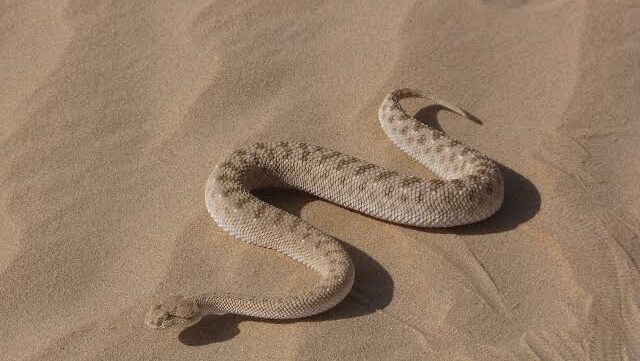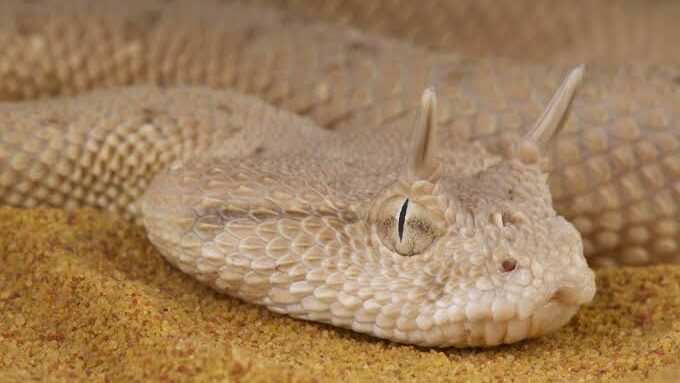Snakes in the UAE: Understanding Nature’s Silent Guardians
Snakes of the UAE :The United Arab Emirates, known for its sprawling deserts, modern cities, and captivating coastline, is also home to an array of unique wildlife. Among its diverse creatures, snakes hold a significant yet often misunderstood presence. While these reptiles may evoke fear in some, they play a vital role in maintaining ecological balance, making their existence both fascinating and essential.
Understanding the types of snakes found in the UAE, their habitats, and their behavior is crucial for appreciating the emirate’s natural biodiversity and staying safe in areas where human and wildlife interaction occurs.

The UAE’s Snake Species

The UAE is home to a variety of snake species, ranging from harmless non-venomous ones to a few venomous types. The diversity of snakes reflects the country’s unique mix of desert, rocky mountain, and coastal environments.
Non-Venomous Snakes:
Many of the snakes found in the UAE are non-venomous and pose no threat to humans. These include species like the Sand Boa, which is well-adapted to the desert’s shifting sands, and the Arabian Cat Snake, a slender species often found in rocky areas. These snakes primarily feed on small mammals, lizards, and insects, playing an important role in controlling pest populations.

Venomous Snakes:
The venomous snakes in the UAE include the Saw-Scaled Viper and the Arabian Horned Viper. The Saw-Scaled Viper, known for its unique hissing sound when threatened, is small but highly venomous. The Arabian Horned Viper, easily identified by the horn-like scales above its eyes, is typically found in desert and rocky regions.
Although encounters with venomous snakes are rare, understanding their behavior and habitats can help reduce risks and foster coexistence.
Snake Habitats in the UAE
Snakes in the UAE thrive in a variety of habitats. The deserts, with their vast expanses of sand dunes, are home to species like the Sand Boa. The rocky terrains of the Hajar Mountains provide shelter for snakes like the Arabian Horned Viper,food and shelter. Coastal regions and mangroves, though less common habitats for snakes, can also host species adapted to these environments.
The adaptability of snakes to these diverse habitats underscores their resilience and ecological importance. By understanding the specific environments where snakes thrive, residents and visitors can better appreciate their role in the ecosystem and avoid potential conflicts.
The Role of Snakes in the Ecosystem
Snakes are often regarded as nature’s silent guardians, playing a critical role in maintaining ecological balance. They help control the populations of rodents, insects, and other small animals that might otherwise grow unchecked. This natural pest control is especially important in agricultural areas, where an overabundance of rodents can damage crops.
Additionally, snakes themselves are prey for larger predators such as birds of prey and wild cats. This makes them an integral part of the food chain, contributing to the overall health of the ecosystem. Without snakes, the delicate balance of nature would be disrupted, leading to unintended consequences for other wildlife and even human activities.
Human-Snake Interactions
In the UAE, human encounters with snakes are rare but not unheard of, especially in areas close to deserts, mountains, or undeveloped land. Most snake species are shy and prefer to avoid humans, striking only when they feel threatened or cornered.
If you encounter a snake, the best course of action is to remain calm and maintain a safe distance. Avoid making sudden movements that could startle the snake. If the snake is in an area where it poses a risk, such as a residential or recreational space, professional wildlife control services should be contacted to safely relocate it.
Educating communities about snakes can also help reduce fear and promote coexistence. Awareness campaigns can emphasize the importance of snakes to the environment while providing practical advice on what to do if a snake is spotted.
Staying Safe in Snake-Prone Areas
For those who enjoy exploring the UAE’s deserts and mountains, taking simple precautions can minimize the risk of encountering snakes:
- Wear Protective Footwear: Sturdy boots and long pants can protect against accidental bites, especially when walking in rocky or sandy areas.
- Be Aware of Your Surroundings: Pay attention to where you step, sit, or place your hands, particularly near rocks, bushes, or crevices.
- Avoid Walking at Night: Many snake species are nocturnal and more active after dark. Carry a flashlight if you must walk at night.
- Do Not Disturb Snakes: If you see a snake, give it space and avoid attempting to handle.
Do follow Uae stories for more Update














